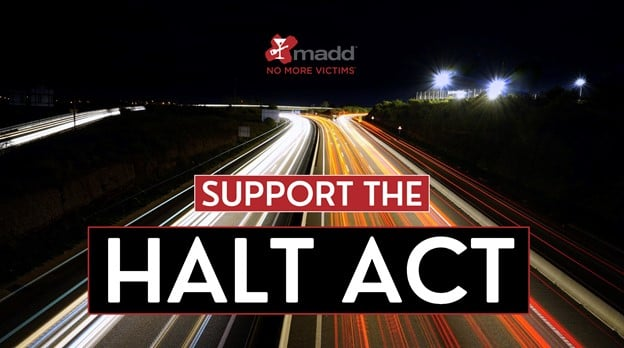MADD Statement on the HALT Act

What the HALT Act Does:
- The HALT (Honoring Abbas Family Legacy to Terminate Drunk Driving) Act calls for the National Highway Traffic Safety Administration (NHTSA) to engage in a rulemaking[1] process that will lead to the installation of advanced passive drunk and impaired driving prevention technology in all vehicles as standard equipment[2].
- The Act is neutral about which systems NHTSA mandates.
- Once the HALT Act becomes law, NHTSA will have to test and evaluate many different types of technologies as part of the rulemaking process before creating technology standards and mandating the technology.
What the HALT Act Does NOT Do:
- The bill does not mandate any particular system(s).
- The bill does not mandate ignition interlocks in cars.
- It does not ask NHTSA to adopt DADSS, which is an alcohol detection system. (The DADSS program has yet to produce a commercially viable product, but it is nonetheless one of the options that NHTSA could choose.)
What the HALT Act Recognizes:
- Advanced passive drunk and impaired driving prevention technology exists and can be implemented (as MADD documented in a response to a NHTSA Request for Information (RFI) in January 2021).
- These technologies include both driving and driver monitoring (currently offered by several auto companies), alcohol detection, or a combination.
- Driving monitoring in production now on almost all new cars could function to prevent drunk and impaired driving if features in the system are enabled
- Driver monitoring technology is also in production now on cars including Volvo, Jaguar Land Rover, Cadillac and Subaru
- To see how a technology solution might work, you can watch this video provided by Volvo: https://www.media.volvocars.com/global/en-gb/media/videos/250162/in-car-cameras-and-intervention-against-intoxication-distraction-animation1
[1] A rulemaking, in this case, is the process that the executive branch of the U.S. government will use to create standards for impairment prevention technology. The process will guide and mandate which type of technology will end up in new vehicles. Multiple types of technology will need to be tested and evaluated before standards will be set.
[2] NHTSA is a federal government agency that is part of the U.S. Department of Transportation. NHTSA sets standards for new cars through a rulemaking process.
Read More about this act and effort on this post here.
